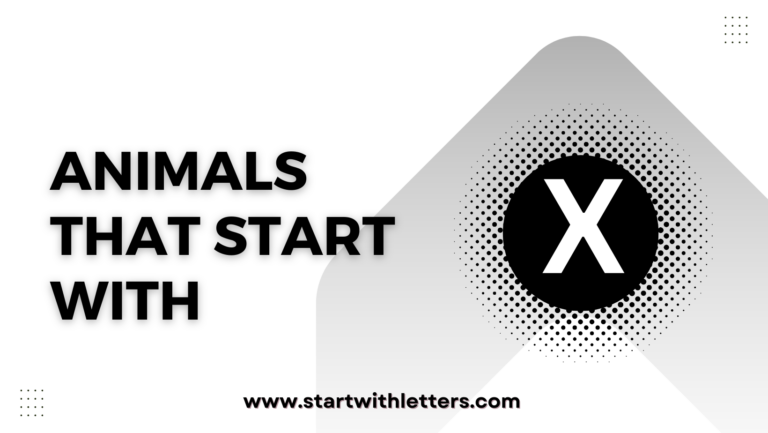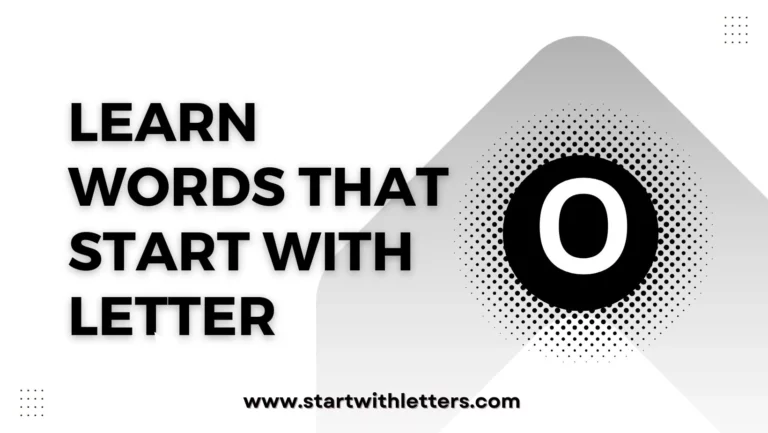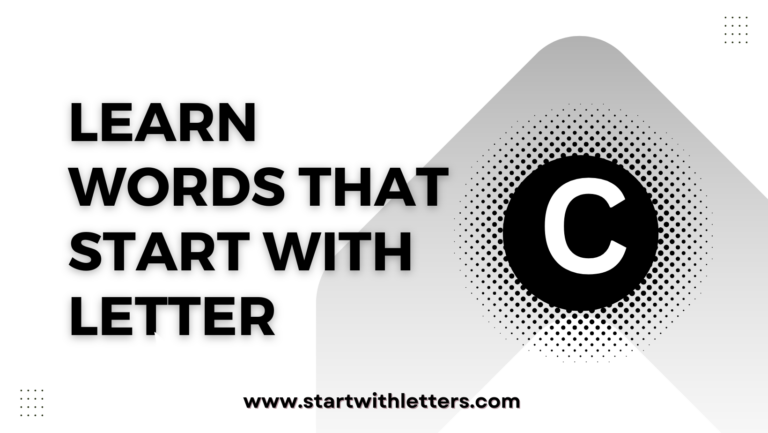Words That Start With CO and Have 5 Letters
Words have the remarkable ability to shape our thoughts, communicate our deepest emotions, and connect us with others. Among the vast knowledge of language, there is a particular charm in words that start with ‘CO.’
These two letters together hold a world of meaning, and in this exploration, we’ll uncover the captivating and diverse lexicon they give birth to.
Positive Words That Start With CO
1. Cozey: This appears to be a variation of the word “cozy,” which means comfortable and warm, often used to describe a comfortable and pleasant environment.
2. Colza: Colza is a type of plant in the mustard family, Brassicaceae, which is cultivated f it ok kojor its seeds, which are used to produce canola oil.
3. Comix: An informal term for comics, typically referring to comic books or comic strips.
4. Cozen: To deceive or trick someone by means of fraud or cunning; to swindle or cheat.
5. Cocky: Informally, this word describes someone who is overly confident or arrogant.
6. Cozes: This word doesn’t have a common English meaning. It may be a variant spelling or a less commonly used word.
7. Cozie: Another spelling of “cozy,” which means comfortable and warm.
8. Cobby: An informal term used to describe something that is stout or sturdy, often used to refer to animals.
9. Codex: A book or manuscript, especially an ancient one, in the form of a handwritten or printed collection of pages bound together.
10. Comfy: A casual abbreviation for “comfortable,” meaning providing physical ease and relaxation.
11. Commy: This word doesn’t have a common English meaning. It may be a variant spelling or a less commonly used word.
12. Coxal: Relating to the hip or hipbone.
13. Coxed: The past tense of the verb “cox,” which means to act as a coxswain (the person who steers and directs a boat).
14. Cocks: The plural form of “cock,” which can refer to a male chicken or be used informally to refer to a male.
15. Conky: This word doesn’t have a common English meaning. It may be a variant spelling or a less commonly used word.
16. Coxae: The plural form of “coxa,” which is a technical term for a body part, specifically the basal segment of an insect’s leg.
17. Coxes: The plural form of “cox,” which refers to the person who steers and directs a boat.
18. Cobbs: This word doesn’t have a common English meaning. It may be a variant spelling or a less commonly used word.
19. Cocci: Plural form of “coccus,” a type of bacterium with a spherical shape.
20. Coffs: This word doesn’t have a common English meaning. It may be a variant spelling or a less commonly used word.
21. Cokey: This word doesn’t have a common English meaning. It may be a variant spelling or a less commonly used word.
22. Combe: A narrow valley or ravine, often wooded.
23. Combo: Short for “combination,” referring to a mixture or combination of things.
24. Combs: Plural form of “comb,” an instrument used to untangle or arrange hair.
25. Comic: Relating to or characteristic of comedy; also, a form of entertainment, such as a comic book, that uses humor.
26. Comma: A punctuation mark used to indicate a pause in a sentence or to separate items in a list.
27. Compo: An abbreviation of “composition,” referring to a written work or a mixture of elements.
28. Comps: A colloquial abbreviation for “complimentary,” often used in the context of free or provided items.
29. Compt: This word doesn’t have a common English meaning. It may be a variant spelling or a less commonly used word.
30. Conch: A type of large, spiral-shaped sea snail shell; also, the edible flesh of this snail.
31. Coomb: An alternative spelling of “combe,” referring to a narrow valley or ravine.
32. Corky: Having qualities similar to cork; also, informal for someone who is eccentric or a little crazy.
33. Couch: A piece of furniture designed for sitting or lying down, typically with a back and arms.
34. Covey: A small group or flock, often referring to birds.
35. Coypu: A large, aquatic rodent native to South America, also known as a “nutria.”
36. Coach: A person who instructs and trains athletes, often in sports.
37. Coked: The past tense of “coke,” which can mean to convert coal into a solid fuel or to use cocaine.
38. Conks: This word can refer to the head or nose, often used informally.
39. Convo: A colloquial abbreviation for “conversation,” referring to a talk or discussion.
40. Cooch: This word doesn’t have a common English meaning. It may be a variant spelling or a less commonly used word.
41. Cotch: This word doesn’t have a common English meaning. It may be a variant spelling or a less commonly used word.
42. Cough: The act of expelling air from the lungs suddenly and involuntarily, often due to irritation or illness.
43. Coved: Having a curved or vaulted shape, like the interior of a dome.
44. Coven: A group of witches or practitioners of magic who meet regularly.
45. Covin: An archaic term for a group of conspirators or plotters.
46. Cowry: A type of small, brightly colored sea snail shell often used historically as currency in various cultures.
47. Coyly: In a shy or reserved manner, often used to describe someone’s behavior.
48. Coble: A type of traditional fishing boat, typically used in the North of England and Scotland.
49. Codec: A software or hardware device that encodes and decodes digital data, often used for audio and video compression.
50. Cohog: An alternative spelling of “quahog,” which is a type of edible clam found in North America.
51. Cokes: The plural form of “coke,” which can refer to a solid fuel made from coal or cocaine.
52. Colic: A term used to describe severe, often fluctuating pain in the abdomen, especially in infants.
53. Colly: An archaic term for soot or coal dust.
54. Comal: Relating to or characteristic of a type of griddle used in Mexican cooking.
55. Conic: Relating to or resembling a cone or conical shape.
56. Cooks: Plural form of “cook,” referring to individuals who prepare food.
57. Copal: A type of tree resin used for incense and varnish.
58. Coped: The past tense of “cope,” which means to deal effectively with a difficult situation.
59. Copen: This word doesn’t have a common English meaning. It may be a variant spelling or a less commonly used word.
60. Corks: Plural form of “cork,” which is used as a stopper for bottles.
61. Coupe: A type of car with a closed body and a fixed roof, typically with two doors.
62. Coups: The plural form of “coup,” refers to a sudden and often violent overthrow of a government.
63. Cover: To place something over or on top of another object; also, a covering or protective layer.
64. Coves: Plural form of “cove,” referring to a small, sheltered inlet or bay.
65. Covet: To desire or wish for something, often strongly and with envy.
66. Cowed: To intimidate or frighten someone into submission.
67. Cowls: Plural form of “cowl,” which can refer to a hood or covering, especially on a garment.
68. Coact: To work or act together with others in a coordinated manner.
69. Coaly: Relating to or resembling coal; also, a term used to describe a dark black color.
70. Coapt: To join or unite closely, often used in a medical context to describe the joining of tissue.
71. Cobia: A type of fish found in warm ocean waters, known for its firm white flesh and mild flavor.
72. Cobra: A highly venomous snake found in Africa and Asia, known for its hooded appearance when threatened.
73. Cocas: Plural form of “coca,” which refers to the plant used to produce cocaine and coca leaves.
74. Cocoa: A powder made from roasted and ground cacao seeds, used to make chocolate and beverages.
75. Cocos: Plural form of “coco,” which can refer to a coconut or coconut palm.
76. Cogon: A type of tall, coarse grass often found in tropical regions.
77. Coifs: Plural form of “coif,” which can refer to a head covering or hairstyle.
78. Coign: An archaic term for a projecting corner or angle of a building.
79. Coley: A type of fish, also known as saithe or coalfish, found in the North Atlantic.
80. Comae: Plural form of “coma,” which refers to a state of deep unconsciousness.
81. Comas: Plural form of “coma,” referring to states of deep unconsciousness.
82. Comer: Someone who is in the process of achieving success or recognition in a particular field.
83. Comes: Plural form of “comus,” which is a term for a merry or festive gathering.
84. Comet: A celestial object consisting of a nucleus of ice and dust that develops a bright, glowing tail as it approaches the sun.
85. Comte: A French title, often used in reference to Auguste Comte, a philosopher known for his work in sociology and positivism.
86. Coney: An archaic term for a rabbit, especially the European rabbit.
87. Conga: A type of Latin American dance and music characterized by a repetitive, rhythmic pattern.
88. Conge: An archaic term for permission or leave, often used in formal contexts.
89. Coofs: This word doesn’t have a common English meaning. It may be a variant spelling or a less commonly used word.
90. Coops: Plural form of “coop,” referring to a small enclosure or cage for keeping animals.
91. Coper: This word doesn’t have a common English meaning. It may be a variant spelling or a less commonly used word.
92. Copes: The third person singular form of “cope,” which means to deal with or handle a situation.
93. Copra: Dried coconut meat, often used to extract coconut oil.
94. Copse: A small group of trees or bushes, often used for shelter or decoration.
95. Coram: An archaic legal term meaning “in the presence of.”
96. Corms: Plural form of “corm,” which is a short, swollen underground plant stem.
97. Corny: Informally, something that is old-fashioned, trite, or lacking in originality; also, relating to corn or corn-like qualities.
98. Corps: A group or organization, often with a specific function or purpose; also, a term used in military contexts to refer to a body of troops.
99. Cosec: An abbreviation for “cosecant,” a trigonometric function in mathematics.
100. Could: The past tense of the modal verb “can,” indicating the ability or possibility of something in the past.
READ ALSO!!
- Positive Words That Start With N With Meaning
- Letter Words That Start With R With Meaning
- Adjectives That Start With N and Their Meaning
- Letter Words That Start With O and Their Meaning
101. Colin: A male given name.
102. Colon: A punctuation mark used to indicate the start of a list or an explanation; also, a part of the large intestine.
103. Condo: Short for “condominium,” which is a type of housing where individuals own their individual units and share common areas with other residents.
104. Coned: Shaped like or resembling a cone.
105. Conin: A term related to the conine, a poisonous alkaloid found in some plants.
106. Conns: Plural form of “conn,” which can refer to a convict or a criminal.
107. Conus: A genus of marine cone snails, often known for their beautiful shells.
108. Cooey: An informal and usually loud call or shout to get someone’s attention.
109. Corgi: A breed of small dog known for its short legs and long body.
110. Cornu: A Latin term for “horn” or “spur.”
111. Cosey: A variant spelling of “cozy,” meaning comfortable and warm.
112. Count: To determine the total number of something; also, a noble title.
113. Coyer: This word doesn’t have a common English meaning. It may be a variant spelling or a less commonly used word.
114. Coala: This word doesn’t have a common English meaning. It may be a variant spelling or a less commonly used word.
115. Coals: Plural form of “coal,” a black or dark brown combustible mineral substance.
116. Codas: Plural form of “coda,” a concluding part of a musical composition.
117. Coder: A person who writes or designs computer code; also, a device or software used for encoding and decoding data.
118. Codes: Plural form of “code,” a set of rules or instructions, often used in computing and cryptography.
119. Coeds: Plural form of “coed,” short for “coeducational,” referring to the mixing of both male and female students in educational institutions.
120. Coils: Plural form of “coil,” a spiral or wound arrangement of something, often wire or tubing.
121. Coins: Plural form of “coin,” a small, flat, typically round piece of metal used as currency.
122. Colas: Plural form of “cola,” a type of carbonated soft drink.
123. Coles: Plural form of “cole,” which can refer to various leafy vegetables like cabbage or kale.
124. Color: The visual perception of different wavelengths of light, often used to describe the appearance of objects.
125. Colts: Plural form of “colt,” a young male horse.
126. Cones: Plural form of “cone,” a three-dimensional geometric shape with a circular base and a pointed top; also, the light-sensitive cells in the retina of the eye.
127. Conte: An Italian word meaning “count” or “earl.”
128. Conto: An Italian word for “account” or “story.”
129. Cooed: The past tense of “coo,” a soft and gentle sound often made by doves and pigeons.
130. Cools: Plural form of “cool,” meaning calm and composed; also, a slang term for approval or admiration.
131. Coral: A marine invertebrate animal that forms hard skeletons and often lives in colonies; also, the pinkish-orange color resembles coral.
132. Cords: Plural form of “cord,” a thick, flexible string or rope.
133. Cored: Past tense of “core,” meaning to remove the central part or core of something.
134. Corns: The plural form of “corn,” is often used to refer to small, painful calluses on the feet.
135. Cotan: This word doesn’t have a common English meaning. It may be a variant spelling or a less commonly used word.
136. Coted: This word doesn’t have a common English meaning. It may be a variant spelling or a less commonly used word.
137. Court: A place where legal proceedings are conducted; also, a royal residence or the people who serve a monarch.
138. Coast: The land along the edge of a sea, ocean, or other large body of water.
139. Coati: A raccoon-like mammal native to Central and South America.
140. Coats: Plural form of “coat,” an outer garment worn to keep warm.
141. Cooee: An Australian Aboriginal word used as a call to attract attention, often used in the phrase “a long way off.”
142. Cooer: This word doesn’t have a common English meaning. It may be a variant spelling or a less commonly used word.
143. Coots: Plural form of “coot,” a type of waterfowl.
144. Corer: A tool or device used to remove the core or center of something, such as an Apple corer.
145. Cores: Plural form of “core,” the central or most important part of something.
146. Coria: This word doesn’t have a common English meaning. It may be a proper name or a less commonly used word.
147. Corse: An archaic term for a corpse or a dead body.
148. Corso: An Italian word meaning “course” or “path.”
149. Costa: A Spanish and Italian word meaning “coast” or “shore.”
150. Costs: A plural form of “cost,” referring to the amount of money required to purchase or produce something.
151. Cotes: Plural form of “cote,” a small shelter or enclosure for animals.
152. Cotta: A liturgical vestment worn by clergy in some Christian denominations.
153. Coady: This word doesn’t have a common English meaning. It may be a proper name or a less commonly used word.
154. Coarb: An Irish term referring to an ecclesiastical office, often associated with a monastic community.
155. Coate: This word doesn’t have a common English meaning. It may be a variant spelling or a less commonly used word.
156. Cobot: A type of collaborative robot designed to work alongside humans.
157. Cobza: A traditional Romanian stringed musical instrument.
158. Cocco: This word doesn’t have a common English meaning. It may be a proper name or a less commonly used word.
159. Cocus: This word doesn’t have a common English meaning. It may be a variant spelling or a less commonly used word.
160. Cogie: This word doesn’t have a common English meaning. It may be a variant spelling or a less commonly used word.
161. Cogue: This word doesn’t have a common English meaning. It may be a variant spelling or a less commonly used word.
162. Cohab: A short form of “cohabitation,” meaning living together in a romantic or domestic relationship without being married.
163. Cohen: A surname of Hebrew origin.
164. Colby: A type of cheese, often used in sandwiches.
165. Colle: This word doesn’t have a common English meaning. It may be a proper name or a less commonly used word.
166. Colls: Plural form of “coll,” an archaic term for a collar.
167. Combi: A short form of “combination,” often used to describe versatile vehicles that combine features of two or more types of vehicles, such as a station wagon and a van.
168. Comby: This word doesn’t have a common English meaning. It may be a variant spelling or a less commonly used word.
169. Comme: A French word meaning “like” or “as,” often used in fashion and design contexts.
170. Commo: A slang abbreviation for “common,” often used in military jargon.
171. Comms: An abbreviation for “communications,” often used in technical and military contexts.
172. Comus: A term used to refer to a festive gathering or revelry, often associated with mythology and literature.
173. Conex: This word doesn’t have a common English meaning. It may be a variant spelling or a less commonly used word.
READ ALSO!!
- Words That Start With W: Nouns, Positive and More
- Adjectives That Start With A to Describe a Person
- Letter Words That Start With E: Nouns, Positive and More
- Words That Start With F: Nouns, Adjectives and More
174. Confs: An abbreviation for “conferences,” often used to refer to gatherings or meetings.
175. Congo: A country in Central Africa; also, a river in Africa.
176. Conia: This word doesn’t have a common English meaning. It may be a variant spelling or a less commonly used word.
177. Conne: An archaic term for a rabbit or hare.
178. Cooky: A colloquial spelling of “cookie,” a small baked sweet treat.
179. Cooly: An archaic term referring to a laborer, often used in historical contexts.
180. Cooms: Plural form of “coom,” which can refer to a narrow, deep valley or dale.
181. Coomy: This word doesn’t have a common English meaning. It may be a variant spelling or a less commonly used word.
182. Coons: Plural form of “coon,” an informal term for a raccoon, often used in the United States.
183. Coopt: The past tense of “co-opt,” meaning to appoint or admit someone into a group, often without their consent.
184. Cooty: This word doesn’t have a common English meaning. It may be a variant spelling or a less commonly used word.
185. Cooze: This word doesn’t have a common English meaning. It may be a variant spelling or a less commonly used word.
186. Copay: A payment made by an insured person as their share of the cost of a covered healthcare service, typically in health insurance.
187. Copha: A brand name for hydrogenated coconut oil, often used in cooking and baking.
188. Coqui: A small tree frog found in Puerto Rico and other Caribbean islands; also, the frog’s distinctive call.
189. Corbe: This word doesn’t have a common English meaning. It may be a variant spelling or a less commonly used word.
190. Corby: A town in Northamptonshire, England; also, a surname.
191. Corda: An Italian word meaning “rope” or “cord.”
192. Corey: A given name, often used for both males and females.
193. Corni: Plural form of “cornu,” a Latin term for “horn” or “spur.”
194. Corno: An Italian word meaning “horn” or “musical instrument horn.”
195. Cosie: A variant spelling of “cozy,” meaning comfortable and warm.
196. Coste: An Italian word meaning “coast” or “shore.”
197. Cotts: This word doesn’t have a common English meaning. It may be a variant spelling or a less commonly used word.
198. Courb: This word doesn’t have a common English meaning. It may be a variant spelling or a less commonly used word.
199. Courd: This word doesn’t have a common English meaning. It may be a variant spelling or a less commonly used word.
200. Cours: An archaic term for a course, path, or journey.
201. Couta: This word doesn’t have a common English meaning. It may be a variant spelling or a less commonly used word.
202. Cowal: A peninsula in Scotland.
203. Cowan: A term used historically to refer to a herder or someone who tends to cows.
204. Coxib: A class of nonsteroidal anti-inflammatory drugs (NSAIDs) used for pain relief and inflammation reduction.
205. Coyau: This word doesn’t have a common English meaning. It may be a variant spelling or a less commonly used word.
206. Cozed: This word doesn’t have a common English meaning. It may be a variant spelling or a less commonly used word.
207. Couth: This word is an archaic term for manners, refinement, or social grace.
208. Cower: To crouch or cringe in fear or submission, often in response to a perceived threat.
209. Coyed: This word doesn’t have a common English meaning. It may be a variant spelling or a less commonly used word.
210. Coded: Written or expressed in a code or cipher; also, having a specific system or language.
211. Coden: This word doesn’t have a common English meaning. It may be a variant spelling or a less commonly used word.
212. Codon: In genetics, a sequence of three nucleotides in DNA or RNA that codes for a specific amino acid or serves as a start or stop signal in protein synthesis.
213. Cohoe: An alternative spelling of “cohog” or “quahog,” which is a type of edible clam found in North America.
214. Cohos: Plural form of “coho,” which is a species of salmon found in North America.
215. Colds: A plural form of “cold,” referring to a common illness characterized by congestion and a sore throat.
216. Coled: This word doesn’t have a common English meaning. It may be a variant spelling or a less commonly used word.
Words that start with ‘CO’ are a captivating symphony of expression, covering everything from cooperation to courage, and from compassion to complexity.
They showcase the rich tapestry of human communication, reminding us of the boundless potential within words.
These ‘CO’ words are a testament to the power of language to inspire, provoke, and unite us, proving that sometimes, all it takes is two letters to open the door to a world of understanding and connection.






